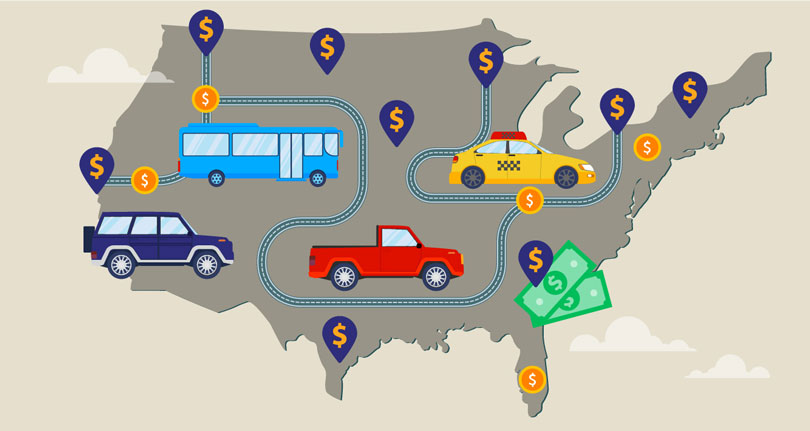Electric Cars vs Gas Cars Cost in Each State 2023
The use of electric vehicles in the U.S. is growing, slowly but surely. The car market is dominated by gas, but each year EV becomes more popular, currently occupying about 14% of market share. [1] Electric Vehicles Market Share - IEA https://www.iea.org/energy-system/transport/electric-vehicles Some states have adopted the technology quicker than others, with California reaching far above the national average at 21.1% at the start of 2023. [2] New ZEV Sales in California https://www.energy.ca.gov/data-reports/energy-almanac/zero-emission-vehicle-and-infrastructure-statistics/new-zev-sales
A key question many people have when looking to buy an electric vehicle is how much it will cost, especially when compared to gas alternatives. This study breaks down a huge number of factors including fuel, energy, mileage, insurance, EV incentives, taxes, registration fees, maintenance, emissions tests, and much more, to work out the complete running cost of EV vs non-EV cars in each state to find out the true price of going green.
Key statistics
- The average annual cost to run an electric vehicle in the USA is $4,856, compared to $4,107 for a gas car, including insurance, taxes, gas, charging and maintenance.
- When factoring in purchase cost, the average cost of an EV is $11,746 each year assuming a purchase period of six years; for a gas car the average purchase cost is $8,281 per year.
- After 11 years of ownership, the Tesla Model Y EV becomes cheaper to own than a gas-powered Honda Civic ($91,820 for Tesla Model Y vs $92,373 for Honda Civic).
- In previous years, electric vehicles were cheaper to run in every state, however, the average insurance for an EV has increased by 58.1% from 2021 to 2023, while insurance for gas cars has only increased by 1.2% in this period.
- New Hampshire is the most affordable state to run an electric vehicle at an average of $3,372 each year, while California is the most expensive state to run an electric vehicle at $6,568 annually.
- New Hampshire is also the cheapest state to run a gas car at $3,153 on average each year, whereas Michigan is the most expensive state to run a gas car at an average of $5,024 per year.
- California has the highest adoption of EV in the U.S., but is the 7th highest state for the cost of EV.
U.S. map of electric vehicle costs
To use the map, select ‘Price difference’ to see the difference between the running cost of EV and non-EV cars in each state. You can also see the specific data for EV cars and non-EV cars below, there’s also the option to add purchase price.
Electric vs gas cars: cost of ownership over time
After 10 years, the ownership costs for the vehicles we analyzed are as follows:
| Years |
Tesla Model Y |
Honda Civic |
Mercedes-Benz A-Class |
2023 Lexus ES |
| 1 |
$11,256.70 |
$8,778.44 |
$12,875.26 |
$15,368.75 |
| 2 |
$22,758.07 |
$17,556.88 |
$25,750.52 |
$30,737.49 |
| 3 |
$34,259.44 |
$26,335.32 |
$38,625.78 |
$46,106.24 |
| 4 |
$45,760.81 |
$35,113.76 |
$51,501.04 |
$61,474.98 |
| 5 |
$57,262.18 |
$43,892.20 |
$64,376.30 |
$76,843.73 |
| 6 |
$68,763.55 |
$52,670.64 |
$77,251.56 |
$92,212.47 |
| 7 |
$73,374.92 |
$57,259.08 |
$84,468.49 |
$99,621.22 |
| 8 |
$77,986.29 |
$66,037.52 |
$91,685.41 |
$107,029.96 |
| 9 |
$82,597.66 |
$74,815.96 |
$98,902.34 |
$114,438.71 |
| 10 |
$87,209.03 |
$83,594.40 |
$106,119.27 |
$121,847.46 |
- Tesla Model Y (EV): $87,209
- Honda Civic (Gas): $83,594
- Mercedes-Benz A-Class (Gas): $106,119
- Lexus ES (EV): $121,847
This includes the purchase price of each vehicle which is split over the first 6 years.
Government & state incentives for electric cars
Government incentives vary per state, from around $100 to over $900 in some areas, but there are electric vehicle subsidies to be found if you look hard enough. These have been factored into our calculations in the map above.
Electric car cost per mile vs gas
It takes 28 kWh to drive 100 miles in a Tesla Model Y. [19] Tesla Model Y Most Efficient Electric SUV Ever - Inside EVs https://insideevs.com/news/665057/tesla-says-model-y-awd-is-most-efficient-electric-suv-ever/ This was used on a state-by-state basis to calculate how much it costs to drive the average mileage in each state. As an average across the USA, this would mean the electric car cost per mile is $0.03, and the gas car comparison cost per mile is $0.10. This just accounts for the cost of electricity and gas in vehicles, not other factors such as maintenance or taxes.
Insurance cost difference between electric & gas cars
The average annual insurance cost for the average American driver (40-year-old male driver with no accidents or violations) for an electric car in the U.S. is $2,648, with California being the most expensive state at $4,244, and Vermont being the cheapest at $595. The average cost for insurance of a gas car in the U.S. is $1,247, with Michigan being the most expensive at $2,328, and North Carolina, the cheapest at $774. The price difference for insurance between electric cars and gas cars is, on average, $1,401 cheaper to insure a gas vehicle.
Is charging an electric car cheaper than gas?
The average annual cost of charging an electric vehicle in America is $466, referred to as the egallon, compared to the average refill cost for a gas car which is $1,031. This cost is based on the average annual mileage per state and the cost of electricity or gas needed to drive this mileage.
With these averages, yes, it is cheaper to charge an electric car than it is to fill a gas car across the year. These prices will vary greatly by state, but in the dataset this study uses, the cost of electricity was cheaper than gas for running vehicles. This is backed up further by the 2018 study done by the University of Michigan who found that EVs were around half the price to run compared to gas alternatives. [18] Relative Costs of Driving Electric and Gasoline Vehicles in the United States - University of Michigan http://websites.umich.edu/~umtriswt/PDF/SWT-2018-1.pdf
Electric vehicle vs gas car tax
Without taking into account incentives and subsidies, taxes on electric vehicles are typically more expensive than gas cars. Across the states, the average cost of taxes for the gas Honda Civic is $394.44 a year, compared to $593.37 for the electric Tesla Model Y.
Maintenance cost for electric cars vs gas
The annual cost of maintenance for electric vehicles, specifically the Tesla Model Y, is $904 a year. [9] Battery-Electric Vehicles Have Lower Scheduled Maintenance Costs than Other Light-Duty Vehicles - Energy.gov https://www.energy.gov/eere/vehicles/articles/fotw-1190-june-14-2021-battery-electric-vehicles-have-lower-scheduled For a gas-powered car, the average annual cost of maintenance, specifically the country’s most popular model, the Honda Civic, is $1,434. This is based on the average annual mileage in each state. The maintenance cost for the average electric vehicle is $530 cheaper each year than a gas alternative.
Methodology
To work out the costs this study used America’s most popular electric car, Tesla’s Model Y, [3] Sales of All Electric Vehicles Worldwide by Model - Statista https://www.statista.com/statistics/960121/sales-of-all-electric-vehicles-worldwide-by-model/ and the most popular gas-powered car, the Honda Civic. [12] New Cars, SUVs and Trucks That Get Great Gas Mileage - Edmunds https://www.edmunds.com/car-news/new-cars-suvs-and-trucks-that-get-great-gas-mileage.html Annual averages assume the cost will be spread out over a six-year period. Costs were analyzed per state, including the prices of gas, electricity, insurance, EV incentives, taxes, registration costs and any other fees specific to a state.
To work out average insurance costs the study used Quote Inspector in the largest city per state, and assumed a 40-year-old male driver with no accidents or violations, $500 comprehensive and collision deductibles, minimum liability limits, and uninsured/under-insured motorist coverage would be included. [15] Car Insurance Rates Honda Civic - Quote Inspector https://www.quoteinspector.com/insurance/car-insurance-rates-by-vehicle/honda/honda-civic/ The average American who drives is between 40-44 years old. [17] Licensed Drivers by Age - FHWA https://www.fhwa.dot.gov/ohim/onh00/bar7.htm
Incentives were applied on a state-by-state basis, including Federal tax credits, State tax credits, Clean Vehicle Rebate Project, Utility Authority rebates, electric vehicle supply equipment (EVSE) rebates, income tax credits, among other funds. This number did not include an assumed cost of parking credits offered by many states.
This study includes Federal and state incentives, tax credits, rebates, and cash incentives for the Tesla Model Y electric vehicle.
For Teslas specifically, annual registration fees, EV ownership fees, home wall charger and labor costs, charging fees, and average additional insurance premiums were accounted for per state. [6] DMV Fees by State - Factory Warranty List https://www.factorywarrantylist.com/dmv-fees-by-state.html
Gas was totaled by using the average price per gallon of regular unleaded in each state. [16] State Gas Price Averages - AAA https://gasprices.aaa.com/state-gas-price-averages/ Charge data was accounted for using an average cost per KwH of Power. Cars were assumed to have an annual mileage of 10,000 miles, the study also used a maintenance cost per mile by state. [9] Battery-Electric Vehicles Have Lower Scheduled Maintenance Costs than Other Light-Duty Vehicles - Energy.gov https://www.energy.gov/eere/vehicles/articles/fotw-1190-june-14-2021-battery-electric-vehicles-have-lower-scheduled [14] Your Driving Costs 2022 - AAA https://newsroom.aaa.com/wp-content/uploads/2022/08/2022-YourDrivingCosts-FactSheet-7-1.pdf Average maintenance costs account for increased costs in years 2-3, this cost has been spread over 3 years accordingly.
Sources






